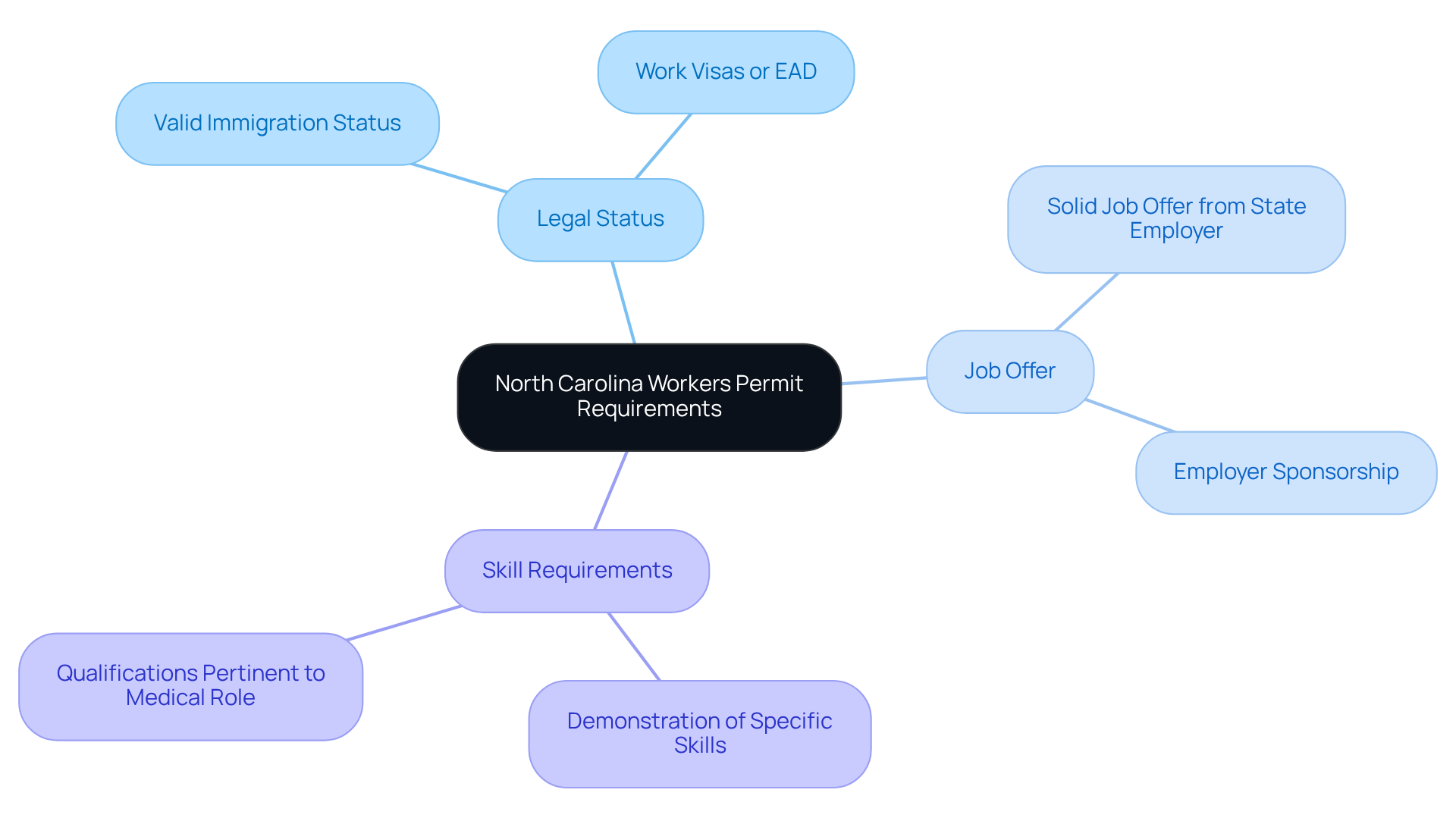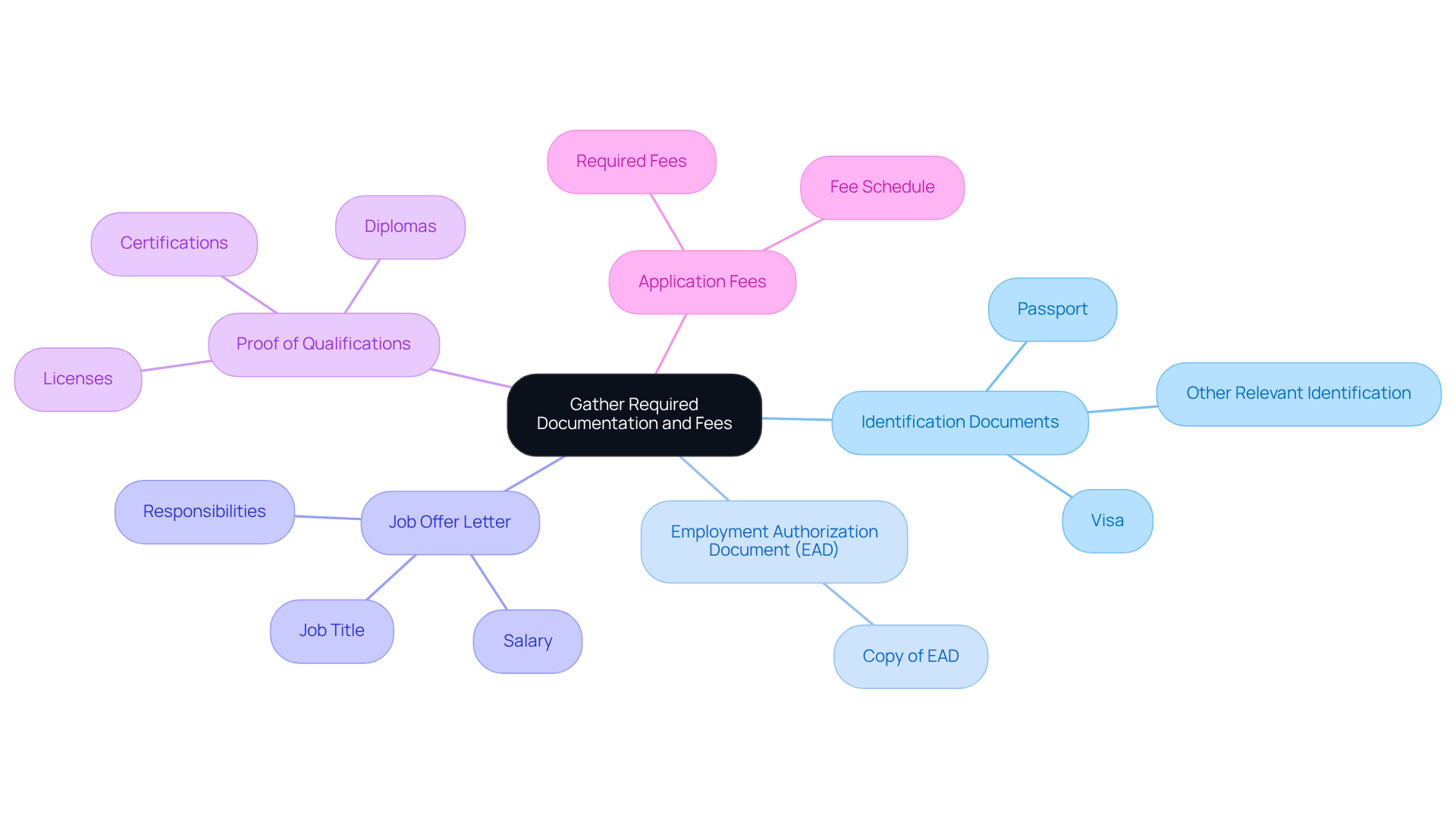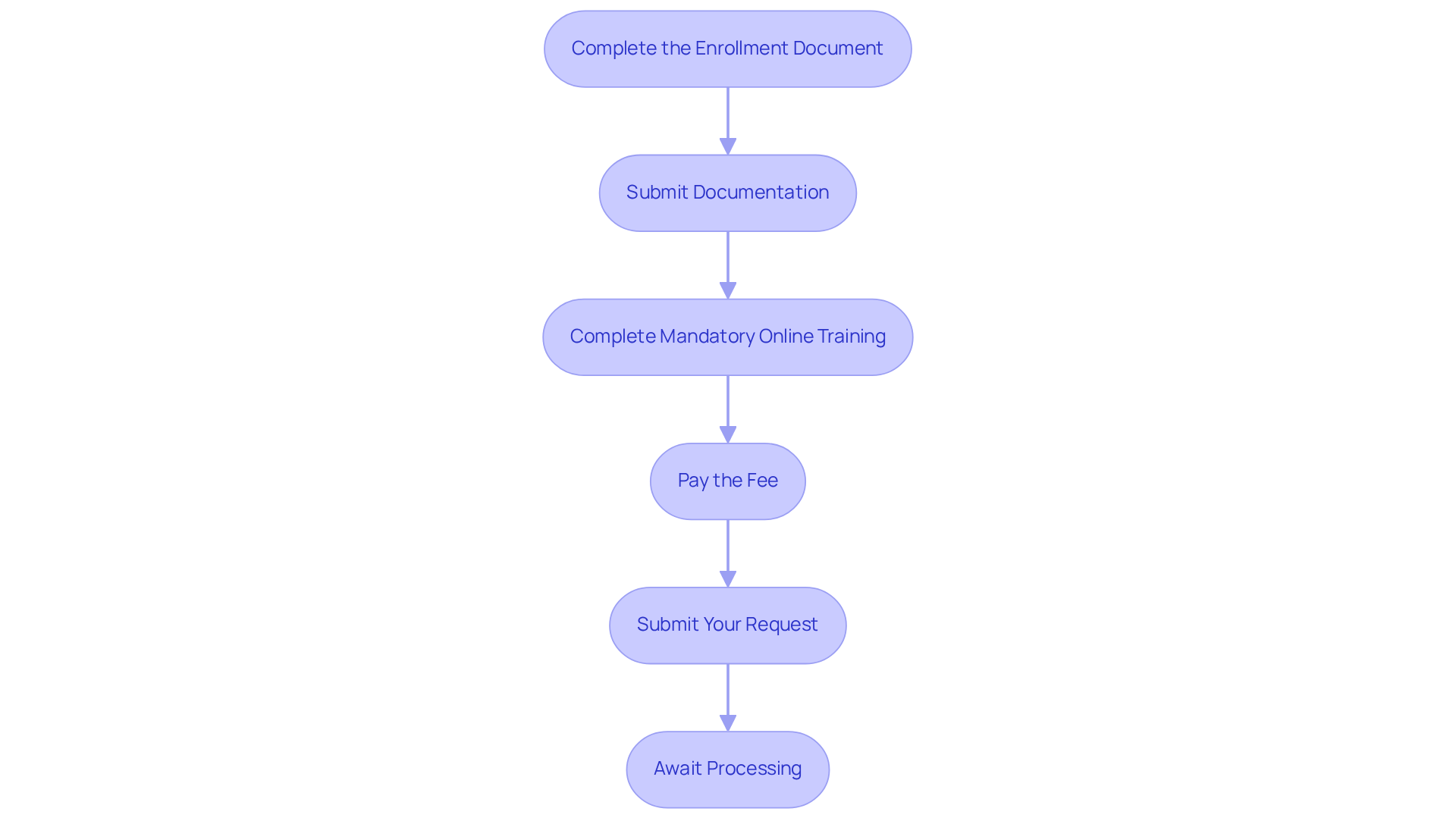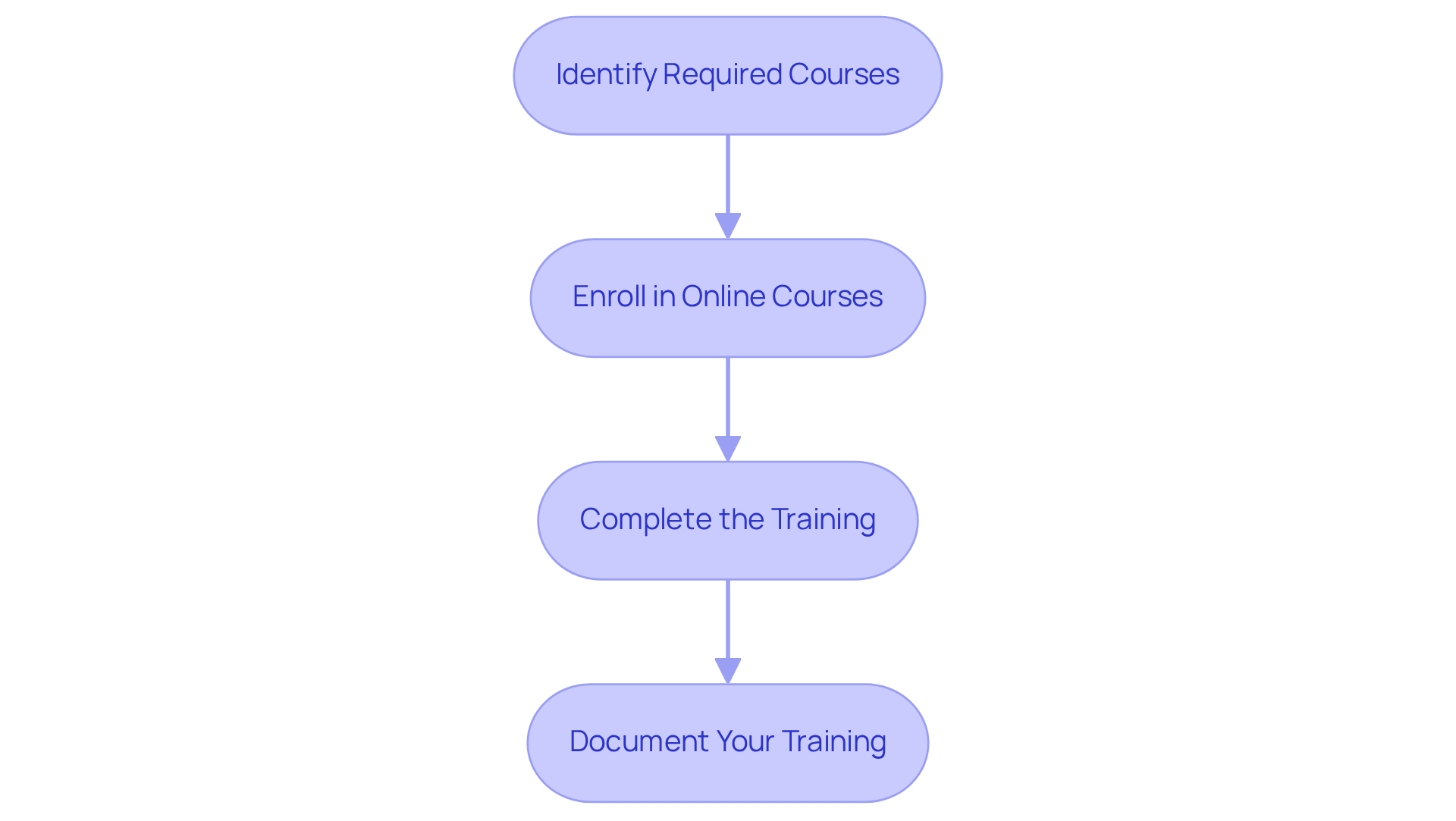Overview
This article is a vital resource for immigrant healthcare workers aiming to secure a North Carolina workers permit. It outlines the eligibility criteria, necessary documentation, and the application process in a straightforward manner.
We understand the challenges you face in navigating confusing immigration processes and the importance of having legal work status. A job offer and completion of required training are crucial not just for compliance, but for boosting your chances of a successful application in a region grappling with a shortage of healthcare providers.
Remember, you’re not alone in this fight—we’re here to support you every step of the way.
Introduction
Navigating the complexities of obtaining a workers permit in North Carolina is no easy feat, especially for immigrant healthcare professionals. In a state where the demand for qualified medical personnel is critical, the stakes are high. This guide breaks down the essential requirements and steps needed to secure a permit, ensuring that you are well-prepared to contribute to the healthcare system.
But with recent legislative changes and varying eligibility criteria, how can you ensure that you meet all necessary qualifications and avoid common pitfalls in the application process? We understand how overwhelming this feels, and we’re here to help you every step of the way.
Understand the North Carolina Workers Permit Requirements
To apply for a permit for workers in the region, immigrant medical professionals face specific eligibility criteria. Let’s break them down:
- Legal Status: You must have a valid immigration status that allows you to work in the U.S. This typically includes those with work visas or employment authorization documents (EAD).
- Job Offer: A solid job offer from a state employer in the southeastern region is essential. Your employer needs to be willing to sponsor you for the permit.
- Skill Requirements: Depending on the job, you may need to demonstrate specific skills or qualifications pertinent to your medical role.
As Jean Brinkley, representative for the state medical board, emphasizes, "We’re going to ensure that anyone who is authorized to practice in this region is proficient." This underscores the importance of meeting the necessary qualifications.
Furthermore, with 93 out of 100 counties in the region lacking primary care providers, attracting qualified healthcare personnel is crucial for improving healthcare access in the state.
Before moving forward with your application, it’s vital to review the North Carolina Department of Labor's guidelines to ensure compliance with all requirements, especially considering recent legislative changes that may impact the process. Remember, you’re not alone in this fight—your future matters to us.

Gather Required Documentation and Fees
Before you submit your application for the nc workers permit, let's ensure you have everything you need to move forward confidently. Here’s a checklist of the essential documentation and fees:
- Identification Documents: Have a copy of your passport, visa, and any other relevant identification ready.
- Employment Authorization Document (EAD): If applicable, include a copy of your EAD to ensure a smooth process.
- Job Offer Letter: Secure a formal letter from your employer that details your job title, responsibilities, and salary. This is crucial for your application.
- Proof of Qualifications: Gather diplomas, certifications, or licenses relevant to your healthcare profession. These documents will support your case.
- Application Fees: Be prepared to pay the required fees, which can vary based on the type of work permit. Check the website of the Department of Labor in the southern state for the most current fee schedule.
Having these documents arranged will simplify the submission process and decrease the chances of complications. Remember, you’re not alone in this fight—we’re here to support you every step of the way.

Follow the Application Process for the Workers Permit
Applying for an NC workers permit can feel overwhelming, but we're here to help you navigate the process with confidence. Follow these steps to ensure a smooth application:
- Complete the Enrollment Document: Start by accessing the enrollment document from the North Carolina Department of Labor's website. Fill it out completely and accurately to avoid any delays in your application.
- Submit Documentation: Gather all required documents, including a valid government-issued ID, social security card, and proof of age. Ensure that all copies are clear and legible. Employers must also provide a detailed job description outlining specific tasks and responsibilities associated with the position.
- Complete Mandatory Online Training: Before you submit your request, make sure to complete the required online training course that focuses on workplace safety and hazard prevention.
- Pay the Fee: Include a check or money order for the $50 processing fee. If you need expedited processing, add an additional $25 to guarantee a response within 24 hours. Remember, processing fees are non-refundable, even if your request is denied.
- Submit Your Request: Send your completed request along with all documentation to the designated office. If you’re applying online, confirm that you receive a submission acknowledgment.
- Await Processing: After submission, keep an eye on your application status. Processing times may vary, so stay patient and be ready to respond to any requests for additional information.
The NC workers permit is valid for two years, after which you'll need to renew it. By carefully following these steps, you can improve your chances of a seamless and efficient process. Remember, we’re in this fight with you—your future matters to us.

Complete Online Training Course and Safety Protocols
Once you submit your application, you may need to complete specific training courses related to your healthcare role. Here’s how to move forward:
- Identify Required Courses: Check with your employer or the North Carolina Department of Health and Human Services for any mandatory training programs. This ensures you’re on the right path from the start.
- Enroll in Online Courses: Many training programs are available online, covering essential topics like patient safety, infection control, and emergency protocols. Look for accredited providers to ensure the training is recognized and valued.
- Complete the Training: Dedicate time to thoroughly complete the courses. Many programs offer certificates upon completion, which may be required for your work permit. This is a crucial step in your journey.
- Document Your Training: Keep copies of your training certificates and any related documentation. You may need to submit these with your work permit application or present them to your employer. Having everything organized will help you feel more prepared.
Completing these training requirements not only fulfills legal obligations but also enhances your qualifications as a healthcare worker. Remember, you’re not alone in this process—we’re here to support you every step of the way.

Conclusion
Navigating the process of obtaining a North Carolina workers permit for immigrant healthcare workers is essential for those eager to contribute to the state's healthcare system. This guide has outlined the critical steps and requirements necessary to secure your permit, emphasizing the importance of:
- Meeting eligibility criteria
- Gathering the right documentation
- Completing necessary training
Have you ever felt lost in the immigration process? Throughout this article, we highlighted key points such as:
- The necessity of having a valid immigration status
- A job offer from a state employer
- The required documentation
Additionally, we underscored the significance of completing online training courses and adhering to safety protocols, ensuring that applicants are well-prepared for their roles in healthcare.
Ultimately, the journey to obtaining a workers permit is not just about meeting legal requirements; it is about enhancing healthcare access in North Carolina. By following this guide, immigrant healthcare workers can play a vital role in addressing the critical shortage of providers in the region. Taking the necessary steps today not only paves the way for a successful application but also contributes to a healthier community tomorrow. Remember, we’re here to fight for your family and your future matters to us.
Frequently Asked Questions
What are the eligibility criteria for immigrant medical professionals applying for a workers permit in North Carolina?
The eligibility criteria include having a valid immigration status that allows you to work in the U.S., a solid job offer from a state employer willing to sponsor you, and the demonstration of specific skills or qualifications relevant to your medical role.
What type of immigration status is required to apply for a workers permit?
Applicants must have a valid immigration status that allows them to work in the U.S., which typically includes work visas or employment authorization documents (EAD).
Is a job offer required for obtaining a workers permit in North Carolina?
Yes, a solid job offer from a state employer in the southeastern region is essential, and the employer must be willing to sponsor the applicant for the permit.
Why is it important to demonstrate specific skills or qualifications for the job?
Demonstrating specific skills or qualifications is important because it ensures that the applicant is proficient and meets the necessary qualifications to practice in the region, as emphasized by state medical board representatives.
What is the current situation regarding primary care providers in North Carolina?
There is a significant need for healthcare personnel in North Carolina, with 93 out of 100 counties lacking primary care providers, highlighting the importance of attracting qualified medical professionals.
Where can applicants find more information about the application process and requirements?
Applicants should review the North Carolina Department of Labor's guidelines to ensure compliance with all requirements, particularly in light of recent legislative changes that may affect the process.




